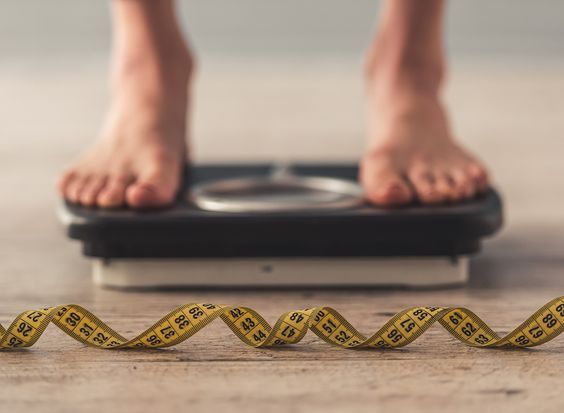
Weight loss is hard. People might often say, “It’s just simple. It’s just how much you eat and how much you work out”. If only it were that easy, people would stop freaking out.
While it’s clearly hard, weight loss is not an impossible task. Several factors come into play in your weight loss journey. "There are many other variables at work, such as heredity, environment, sleeping patterns, and muscle mass. Weight management is incredibly difficult,” says Amy Gorin, RDN, who specialises in plant-based eating in Stamford, Connecticut.
If you’re googling “Why am I not losing weight” and become stuck, you’re in the right place. In this blog, we’re going to look into some hidden reasons why you’re not losing weight, along with some suggestions as well!
Inconsistent Calorie Intake
 Weight loss is determined by maintaining a balance between calories burned and calories consumed. Eating too few or too many calories can hinder development.
Weight loss is determined by maintaining a balance between calories burned and calories consumed. Eating too few or too many calories can hinder development.
A study, published in the Journal of Biological Rhythms, indicates that irregular meal timing can impact daily caloric intake, potentially influencing weight management.
Many people underestimate the process of weight loss and calorie intake by restricting themselves for so long and indulging in unhealthy food thereafter. Keeping a food diary, tracking portions, and maintaining a consistent caloric deficit are essential for sustainable weight loss.
Lack of Variety in Physical Activity
 If your exercise routine is the same, you may experience a plateau as your body adjusts and starts to burn fewer calories. By mixing up your workouts, you can keep your muscles challenged and avoid getting bored.
If your exercise routine is the same, you may experience a plateau as your body adjusts and starts to burn fewer calories. By mixing up your workouts, you can keep your muscles challenged and avoid getting bored.
Try out a mix of cardiovascular exercises, strength training, and flexible workouts. Check out some martial arts studios in your area to have physical activity and discipline altogether. Swimming is also a great option, challenging your muscles and stamina deeply. Or shock your muscles by lifting some weights underwater (just kidding :) ).
Insufficient Sleep
 Sleep is crucial if you wanna achieve your weight loss goals. Insufficient sleep disrupts hormones responsible for hunger and satiety, leading to increased cravings for high-calorie, sugary foods.
Sleep is crucial if you wanna achieve your weight loss goals. Insufficient sleep disrupts hormones responsible for hunger and satiety, leading to increased cravings for high-calorie, sugary foods.
Numerous studies have shown that insufficient sleep has led to weight loss problems for many, particularly women. A study published in the American Journal of Epidemiology has shown that women who sleep for 5 hours per night are more likely to gain weight than those who sleep for 7 hours.
Try to aim for 7-9 hours of quality sleep each night to support your body's natural processes, including metabolism and appetite regulation. Reduce blue light exposure around you and avoid eating anything 1-2 hours before your sleep to get a good night’s sleep!
Stress and Emotional Eating
 Chronic stress triggers the release of cortisol, a hormone associated with weight gain, particularly around the abdominal area. Stress can also lead to emotional eating as a coping mechanism.
Chronic stress triggers the release of cortisol, a hormone associated with weight gain, particularly around the abdominal area. Stress can also lead to emotional eating as a coping mechanism.
During times of stress, there is often a preference for highly palatable, energy-dense foods, often rich in sugar and fat. These foods can provide a temporary sense of comfort and pleasure but may contribute to an unhealthy cycle of emotional eating and weight-related concerns.
There are many ways to cope with stress and avoid emotional eating altogether:
- Engaging in regular physical activity to reduce stress levels and improve mood.
- Incorporating mindfulness techniques, such as meditation or deep breathing exercises, to manage stress.
- Seeking support from friends, family, or a mental health professional to address underlying emotional triggers.
Underlying Medical Conditions
 Certain medical conditions, such as thyroid disorders or hormonal imbalances, can hinder weight loss efforts. It's crucial to consult with a healthcare professional if you're consistently struggling to lose weight despite lifestyle modifications. They can conduct necessary tests to rule out any underlying issues and provide tailored guidance for your unique situation.
Certain medical conditions, such as thyroid disorders or hormonal imbalances, can hinder weight loss efforts. It's crucial to consult with a healthcare professional if you're consistently struggling to lose weight despite lifestyle modifications. They can conduct necessary tests to rule out any underlying issues and provide tailored guidance for your unique situation.
Well, there you have it! Even though there are more reasons than the one mentioned above for why you’re not losing weight, following the tips and aiming for a more sustainable life can help you achieve your weight loss goals faster than you might have imagined.
We all have probably struggled with weight loss once in our lifetime and have always wished for some kind of help or support from others. SkinnyMint is here to help you achieve your weight loss goals with our comprehensive range of products, such as the Berberine gummies, ACV+ gummies, Green cleansing elixir, and more.
The gummies are a tasty snack to pop into your mouth while enjoying the benefits of berberine and apple cider vinegar. The Green Cleansing Elixir comprises of 22 superfoods and probiotics to support your gut health and boost your metabolism. Similarly, each of SkinnyMint’s products are designed to give you the ultimate start of the day and improve your health.
Head over to our website and check out SkinnyMint’s products to transform your life for the better!
Also Read: 6 Surprising Reasons You’re Still Not Losing Weight
FAQs
-
What are the main reasons for not losing weight?
Ans. There are several reasons why someone may not be losing weight despite regular exercise and dietary efforts. Common factors include overeating, underestimating calorie intake, inadequate physical activity, hormonal imbalances, lack of sleep, and medical conditions. -
Why am I working out every day but not losing weight?
Ans. Several factors could contribute to not losing weight despite daily workouts. It's essential to evaluate your diet, as overeating can counteract the calories burned during exercise. Additionally, the intensity and type of workouts, as well as individual metabolic differences, can influence weight loss. Insufficient sleep, stress, and medical conditions may also play a role. -
How do I fix not losing weight?
Ans. To address the issue of not losing weight, consider the following steps:- Reevaluate your diet and ensure you are in a calorie deficit.
- Check the intensity and variety of your workouts for effectiveness.
- Get sufficient sleep and manage stress levels.
- Consult with a healthcare professional to rule out any underlying medical issues.
- Stay consistent with healthy habits and be patient, as weight loss takes time.
-
What is the 30 30 30 rule for weight loss?
Ans. The 30-30-30 rule is not a widely recognised concept for weight loss. It's crucial to base your weight loss approach on proven principles, such as maintaining a balanced diet, engaging in regular physical activity, staying hydrated, and getting adequate sleep. Always consult with healthcare or fitness professionals for personalised advice.







